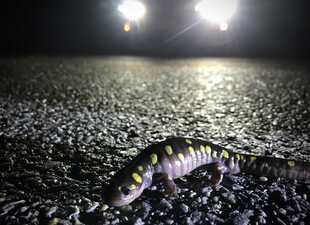Slow Down for Frogs and Salamanders
MONTPELIER, Vt. — Vermont Fish and Wildlife is asking drivers to slow down and be cautious when travelling at night in early spring or to take alternate routes to avoid driving roads near ponds and wetlands that salamanders and frogs cross during their breeding season.
"One of the benefits of checking out amphibian road crossings," says Fish and Wildlife herpetologist Luke Groff, "is that you can see many individuals and species in a short period and small area, and some species may not be seen the rest of the year. The spotted and blue-spotted salamanders, for example, belong to a group called the "mole salamanders, because after breeding, they retreat underground or under logs or stumps, and are rarely seen until the next spring."
Road crossings are also a great way to see rare or otherwise hard-to-find species, which biologists rely on for data collection. For example, the four-toed salamander is rare in Vermont, and its distribution is not well understood. This information is used by Fish and Wildlife, the Agency of Transportation and other conservation partners to assess the need for wildlife passages and barriers in road construction plans that allow all wildlife, not just frogs and salamanders, to more safely cross roadways.
Groff is encouraging Vermonters to explore their nearby roads and report amphibian road crossings to the Vermont Reptile and Amphibian Atlas (
https://www.vtherpatlas.org/sighting-submission-form). If you can safely take photos of the amphibian species crossing, please include them.
Vermonters who wish to contribute to the Fish and Wildlife Department's work to conserve frog and salamander populations can donate to the Nongame Wildlife Fund on their state income tax form or on the Vermont Fish and Wildlife website.

